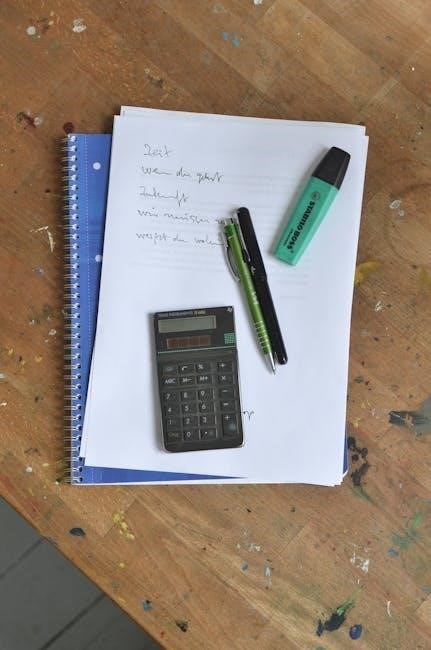The GCSE Maths Paper 1 2023 is a foundational exam assessing core mathematical skills, covering number operations, algebra, geometry, and statistics․ It is crucial for students to familiarize themselves with the exam structure and content to ensure effective preparation and achieve success in their GCSE results․
1․1 Overview of the Exam Structure
The GCSE Maths Paper 1 2023 exam is 1 hour and 30 minutes long, consisting of 80 marks․ It features a mix of multiple-choice, short-answer, and extended-response questions․ The paper covers core topics like number operations, algebra, geometry, and statistics․ Questions are designed to test understanding, application, and problem-solving skills․ The exam structure ensures a balanced assessment of mathematical abilities, preparing students for further education and real-world applications․
1․2 Key Features of the 2023 Paper
The 2023 GCSE Maths Paper 1 emphasizes problem-solving and real-world applications, with a focus on foundational mathematical skills․ It introduces revised question types, including multi-step problems and scenario-based questions, to assess deeper understanding․ The paper also features increased emphasis on algebraic manipulation and graphical interpretation․ Command words like “show” and “prove” are prominently used, guiding students to provide clear, structured responses․ Mark allocations are balanced across question types, ensuring fairness and comprehensive assessment of mathematical proficiency․

Key Topics Covered in GCSE Maths Paper 1 2023
The paper covers essential maths areas, including number operations, algebra, geometry, trigonometry, and statistics, ensuring a comprehensive assessment of foundational mathematical skills and concepts․
2․1 Number Operations and Algebra
Number operations and algebra are core components of GCSE Maths Paper 1 2023․ Students must demonstrate proficiency in arithmetic, including fractions, decimals, and percentages․ Algebraic skills involve solving linear and quadratic equations, manipulating expressions, and understanding formulae․ Additionally, topics like sequences, functions, and graph interpretation are included․ These areas require strong problem-solving abilities and logical thinking․ Mastery of number operations and algebra is essential for tackling more complex maths problems effectively in the exam and real-world scenarios․
2․2 Geometry and trigonometry
Geometry and trigonometry are fundamental areas in GCSE Maths Paper 1 2023․ Geometry focuses on properties of shapes, angles, and measurements, including polygons, circles, and 3D objects․ Trigonometry introduces concepts like sine, cosine, and tangent, essential for solving triangle problems and understanding wave patterns․ Key topics include Pythagoras’ theorem, similarity, and congruence․ These skills are vital for spatial reasoning and problem-solving, preparing students for practical applications in fields like engineering and physics․
2․3 Statistics and Probability
Statistics and Probability in GCSE Maths Paper 1 2023 involve analyzing and interpreting data․ Key topics include histograms, probability rules, and combinatorics․ Students learn to calculate probabilities, understand statistical measures, and apply concepts like Venn diagrams and tree diagrams․ These skills are essential for making informed decisions and solving real-world problems․ Mastering these areas enhances logical reasoning and prepares students for advanced mathematical studies․

Accessing the GCSE Maths Paper 1 2023 PDF
Access the GCSE Maths Paper 1 2023 PDF through official sources like exam boards or educational websites․ Ensure authenticity by downloading from trusted platforms for accurate preparation․
3․1 Official Sources for the PDF
The GCSE Maths Paper 1 2023 PDF can be accessed through official sources such as the exam board’s website (e․g․, AQA, OCR, or Edexcel), educational platforms, or your school’s resource portal․ To ensure authenticity, verify the source by checking for official logos and publication dates․ Additionally, trusted educational websites may provide links to download the PDF directly․ Always prioritize official sources to guarantee the accuracy and relevance of the exam materials for effective preparation․
3․2 How to Download and Use the PDF
To download the GCSE Maths Paper 1 2023 PDF, navigate to the official source or educational platform, locate the document, and click the download link․ Save the file to your device for easy access․ Use the PDF for revision by attempting questions, timing yourself, and reviewing answers․ This helps familiarize yourself with the exam format and improves time management․ Regular practice with the PDF ensures effective preparation and boosts confidence for the actual exam․

Study Tips for GCSE Maths Paper 1 Preparation
Effective study tips for GCSE Maths Paper 1 include creating a structured study schedule, practising with past papers, understanding key concepts, and using flashcards for revision․
4․1 Effective Revision Strategies
Effective revision for GCSE Maths Paper 1 involves active learning techniques, such as note-taking and summarizing key concepts․ Use flashcards to memorize formulas and definitions․ Regularly practice past papers to build exam stamina and time management skills․ Set realistic goals for each study session and track progress․ Focus on understanding rather than rote learning, and seek clarification on difficult topics․ Teaching concepts to someone else can also reinforce your own understanding and retention of the material․
4․2 Time Management Techniques
Effective time management is crucial for success in GCSE Maths Paper 1․ Allocate specific time slots for each topic during revision․ Use a timer during practice sessions to simulate exam conditions․ Prioritize questions based on difficulty and marks allocated․ Take short breaks between study sessions to maintain focus․ Plan your exam day schedule to ensure punctuality and composure․ By managing time wisely, you can maximize productivity and reduce exam anxiety, leading to better performance․

Common Mistakes to Avoid in GCSE Maths Paper 1
Common mistakes include calculation errors, misinterpreting question types, and poor time management․ Students often overlook simplifying steps or misapply formulas, leading to unnecessary marks loss․ Ensure thorough practice and attention to detail to minimize these errors and improve overall performance effectively․
5․1 Understanding Question Types
Understanding question types in GCSE Maths Paper 1 is crucial for effective preparation․ The paper includes multiple-choice, short-answer, and extended open-response questions․ Recognizing these formats helps students tailor their strategies․ For instance, multiple-choice questions may require strategic guessing, while open-response questions demand clear, step-by-step solutions․ Familiarizing oneself with question structures and command words ensures better time management and reduces errors․ Practicing past papers and reviewing mark schemes can enhance comprehension of question types and improve overall performance significantly․
5․2 Avoiding Calculation Errors
Avoiding calculation errors in GCSE Maths Paper 1 requires careful attention to detail and systematic approaches․ Regularly checking work, breaking down problems into smaller steps, and using estimation to verify answers are effective strategies․ Reading questions thoroughly to avoid misinterpretation is also vital․ Additionally, managing time wisely to avoid rushed calculations and ensuring all steps are clearly written can prevent mistakes․ Practicing mental maths and using calculators judiciously further minimizes errors, helping students achieve accurate and confident results in their examinations․

Practice Exercises and Past Papers
Practice exercises and past papers are essential tools for mastering GCSE Maths Paper 1․ They provide hands-on experience, helping students identify weaknesses and build confidence in problem-solving skills․
6․1 Benefits of Practicing Past Papers
Practicing past papers for GCSE Maths Paper 1 offers numerous benefits, including improved time management, familiarization with exam formats, and enhanced problem-solving skills․ By tackling real questions, students can identify their strengths and weaknesses, allowing targeted revision․ Regular practice also builds confidence and reduces exam anxiety, ensuring better performance on the actual test day․ Additionally, past papers provide insights into common question types and trends, helping students prepare more effectively․
6․2 Where to Find Additional Resources
Additional resources for GCSE Maths Paper 1 2023 can be found on official exam board websites, such as AQA, OCR, and Edexcel, which provide past papers, mark schemes, and revision guides․ Educational platforms like BBC Bitesize and MyMaths also offer interactive lessons and practice exercises․ Using specific search queries with Boolean operators (e․g․, “GCSE Maths Paper 1 2023 PDF”) can help locate reliable materials quickly․ These resources are invaluable for targeted revision and exam preparation․

Exam Format and Timing
The GCSE Maths Paper 1 2023 is a non-calculator exam, lasting 1 hour and 30 minutes, with 80 marks․ It covers a range of topics, structured to assess core mathematical skills and problem-solving abilities․
7․1 Understanding the Exam Duration
The GCSE Maths Paper 1 2023 lasts 1 hour and 30 minutes, giving students ample time to tackle all questions․ The exam is divided into sections, with questions ranging from foundation to higher-tier difficulty․ Time management is crucial, as students must allocate sufficient time to each question based on its mark allocation․ Practicing past papers under timed conditions can help students adapt to the exam’s pacing and ensure they complete all sections confidently․
7․2 Allocation of Marks and Question Distribution
The GCSE Maths Paper 1 2023 is divided into sections with questions varying in difficulty․ The exam comprises 80 marks, with questions distributed across number, algebra, geometry, and statistics․ Higher-tier questions carry more weight, requiring detailed problem-solving skills․ Students should allocate time strategically, prioritizing high-mark questions while ensuring accuracy in lower-tier problems․ Understanding the mark distribution helps in managing time effectively and maximizing scores․ Practicing past papers aids in familiarizing oneself with the question pattern and weightage․

Specific Challenges in the 2023 Paper
The 2023 GCSE Maths Paper 1 includes challenging problems requiring strong problem-solving skills․ Students face tough algebraic manipulations and complex multi-step questions․ Proper time management and thorough review are essential․
8․1 Difficult Questions and Solutions
The 2023 GCSE Maths Paper 1 features challenging questions, particularly in algebra and multi-step problem-solving․ Students often struggle with complex algebraic manipulations and applying concepts to real-world scenarios․ To overcome these difficulties, it is essential to practice breaking down problems into manageable steps and reviewing fundamental concepts․ Utilizing past papers and seeking guidance on tricky topics can also provide clarity and improve problem-solving strategies․ Effective time management during practice is crucial to ensure comprehensive preparation for the exam․
8․2 Expert Tips for Tackling Tough Problems
Start with simpler questions to build confidence and maintain momentum․ Skim through the paper to identify challenging sections early․ Always show your working, as marks can be awarded for correct methods․ Use estimation to check if answers are reasonable; Break complex problems into smaller, manageable parts․ Highlight key information to focus on what’s important․ Practice past papers to familiarize yourself with common problem types․ Seek patterns or relationships between numbers to simplify calculations․ Stay calm and methodical to avoid unnecessary mistakes․

Importance of the GCSE Maths Paper 1
The GCSE Maths Paper 1 is crucial for assessing core mathematical skills and problem-solving abilities․ It significantly impacts overall GCSE results and prepares students for further academic and career opportunities․
9․1 Impact on Overall GCSE Results
The GCSE Maths Paper 1 significantly influences overall results, as it assesses core mathematical skills and problem-solving abilities․ A strong performance boosts confidence and grades, while weaker results may require additional support․ Since maths is a key GCSE subject, success in Paper 1 directly impacts students’ overall performance and eligibility for competitive academic pathways․ Achieving a high score in Paper 1 is essential for maintaining a strong foundation for further education and career opportunities․
9․2 Preparing for Further Education
Success in GCSE Maths Paper 1 2023 is vital for students aiming to pursue advanced mathematical studies or STEM-related fields․ The exam refines problem-solving, logical reasoning, and analytical skills, which are essential for A-levels, vocational courses, or apprenticeships․ Mastery of Paper 1 concepts builds a strong foundation for tackling more complex topics in further education․ Additionally, excelling in this paper demonstrates academic readiness, boosting confidence and preparedness for future challenges in both education and career pathways․

Final Tips for Success
Stay calm, manage your time effectively, and review your answers before submission․ These strategies will help you maximize your performance and achieve the best possible results․
10․1 Staying Calm During the Exam
Staying calm during the GCSE Maths Paper 1 2023 exam is crucial for optimal performance․ Practice deep breathing exercises beforehand to maintain focus․ Visualize success to build confidence․ Avoid rushing through questions—take moments to read each carefully․ Prioritize manageable problems first to secure early marks․ Remember, time management is key․ Maintain a positive mindset and remind yourself of your preparation․ A calm and composed approach will help you tackle challenges effectively and make clear, reasoned decisions under pressure․
10․2 Reviewing Answers Before Submission
Reviewing your answers before submitting the GCSE Maths Paper 1 2023 is essential for catching errors and ensuring accuracy․ Allocate the last 10 minutes of the exam to check calculations, verify steps, and confirm that all questions are answered․ Pay attention to arithmetic mistakes and misread questions․ Cross-checking your work helps identify overlooked errors and improves your overall score․ A thorough review demonstrates attention to detail and maximizes your potential for success in the exam․